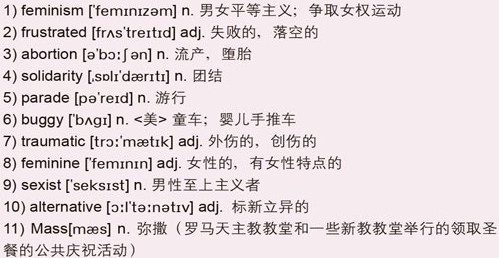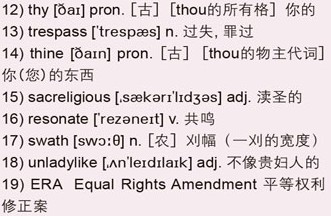相比一百多年前,当今女性的地位已经得到了很大提高,这不得不说是由一代又一代的女权运动换来的。尽管女性的弱势地位仍未得到根本改变,但是当今的女性已经在经济上、心理上都更加独立和自信,那么我们是否可以了解早期女权主义者的心情和争取自身权益的艰难呢?
贾姬·赛波洛斯是1970年纽约妇女游行活动的组织者之一,本期的《滋味人生》,我们就跟随她回到40年前的纽约,回顾数万妇女攻陷第五大道的情景。那时那地,她们的兴趣可不在逛街上。
发音:英美发音
语速:150词/分钟
使用方法:泛听+复述
Claire: It's August 26th, 1970, exactly 50 years since women in America got the vote. But many of the women who've benefited from that first wave of 1)feminism now find themselves 2)frustrated. Equality of opportunity still seems a way off. It's time for action.
克莱尔:那是1970年8月26号,正好是美国妇女获得选举权50周年的纪念日。但许多曾从第一波女性主义运动中获益的妇女却发现现实令人失望。实现男女机会平等似乎遥遥无期。是时候行动了。
Jacqui Ceballos: I was so scared that, when I'd get to Fifth Avenue, I wouldn't see anything but about 5,000 women, and I'll just never, never forget it, that when I turned the corner you could not see the end of the crowd. It was unbelievable!
贾姬·赛波洛斯:我当时很害怕,等我到达第五大道的时候只有不过5000左右的妇女。我永远、永远无法忘记当我走过街角发现那看不到尽头的人群时的情景,实在太难以置信了!
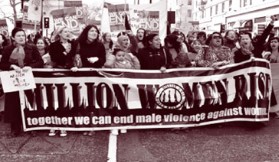 Claire: Jacqui Ceballos of the National Organization for Women has been planning this for months. The women have three specific demands: equal opportunity in employment and education, free 3)abortion on demand, and centres to provide 24-hour child care. But mostly the march offers a chance to express 4)solidarity.
Claire: Jacqui Ceballos of the National Organization for Women has been planning this for months. The women have three specific demands: equal opportunity in employment and education, free 3)abortion on demand, and centres to provide 24-hour child care. But mostly the march offers a chance to express 4)solidarity.
克莱尔:(美国)全国妇女组织的贾姬·赛波洛斯花了几个月时间策划这场示威游行。参与妇女提出了三个明确的要求:实现男女就业及教育机会平等、自由选择堕胎权利以及(建立)24小时托儿中心。但示威游行更多地为这些妇女提供了一个展示团结的机会。
Jacqui: Now they had started us at 57th street. Cars were beeping on the sides because they had only given us half the street, mind you, even though every other 5)parade always had the whole avenue. When the whistle blew, the women ran in the front with “women of the world unite” took the whole avenue. The cars on the side were beeping like mad because they couldn't cross the avenue, you see, and it was unbelievable. It wasn't a march like the early marches in the 1900s. Everybody was running this way and that; there were women pushing 6)buggies, there were men, it was unbelievable—all ages. And on the sidewalks, the sidewalks were packed and people... we would say to the women: “Join us! Join us!” And lots of them would join us. Of course there were men there with signs saying we belonged in the home and all of that. Later on I heard stories of many women who worked in Fifth Avenue talking about it. Their bosses would say: “Well those crazy women.” They'd say: “Those crazy women? I'm gonna join them!” And they'd run downstairs and join them.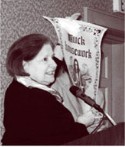 贾姬:游行是从第57街开始的。路上的汽车喇叭按个不停,因为当局只给了我们半边街道作为示威游行路线,顺便提醒一下,而其他的示威游行通常都能使用整条街道。当哨子鸣响,跑在队伍前面的拉着“全世界的妇女团结起来”横幅的妇女占领了整条街道。路边的汽车发了疯似地按着喇叭,因为你知道,他们根本无法驶过路对面去,一切都让人觉得难以置信。这场示威游行不像二十世纪初那些早期的示威游行。人们左右奔走,有推着婴儿车的妇女,也有男人——你或许不相信——各个年龄层都有。在人行道上,人行道挤满了人……我们对着路上的妇女喊:“加入我们!加入我们!”很多人都加入了。当然,也有男人标牌写着我们(妇女)只适合留在家中之类的。后来我还听很多在第五大道工作的妇女谈起当时的情况。她们的老板说:“哎,那些疯女人。”然后她们回道:“那些疯女人?我就要去加入到她们当中!”然后她们跑下楼,加入到游行队伍中来。
贾姬:游行是从第57街开始的。路上的汽车喇叭按个不停,因为当局只给了我们半边街道作为示威游行路线,顺便提醒一下,而其他的示威游行通常都能使用整条街道。当哨子鸣响,跑在队伍前面的拉着“全世界的妇女团结起来”横幅的妇女占领了整条街道。路边的汽车发了疯似地按着喇叭,因为你知道,他们根本无法驶过路对面去,一切都让人觉得难以置信。这场示威游行不像二十世纪初那些早期的示威游行。人们左右奔走,有推着婴儿车的妇女,也有男人——你或许不相信——各个年龄层都有。在人行道上,人行道挤满了人……我们对着路上的妇女喊:“加入我们!加入我们!”很多人都加入了。当然,也有男人标牌写着我们(妇女)只适合留在家中之类的。后来我还听很多在第五大道工作的妇女谈起当时的情况。她们的老板说:“哎,那些疯女人。”然后她们回道:“那些疯女人?我就要去加入到她们当中!”然后她们跑下楼,加入到游行队伍中来。
Claire: Jacqui herself only became active in the feminist movement in her 40s, when trying to combine life as a mother of four and as director of a successful new opera company.
克莱尔:作为四个孩子的母亲,同时是一家卓有成就的新兴戏剧公司的导演,贾姬本人直到40岁后才变成女性主义运动的活跃人物。
Jacqui: My husband was very jealous, okay? And he left the house—it was very 7)traumatic—and some said he was right, you know. I shouldn't be so involved in public life. And a friend just handed me Betty Friedan's book, The 8)Feminine Mystique. I know I was a feminist from the time I was a child, but Betty's book hit me right where I was at the time. And it just like I knew it wasn't me, it wasn't men, it was society, and society had to change. My committee was the strike committee—how to get things going—and I said: “How are we gonna get fifty thousand to march?” And this young woman—her name was Pat Lawrence—she said: “We'll take over the Statue of Liberty.” I said: “What do you mean? The Puerto Ricans took it over last year and they're in jail, and they've tripled the guard.” And she said, “We'll know how to do it!”
贾姬:我丈夫非常嫉妒,知道吗?他离开了家——这是个沉重的打击——而你知道吗,有些人说他是对的,说我不该这么热衷于公众事务。有个朋友送给我一本贝蒂·弗里丹的书,《女性的奥秘》。我从小就知道我是个女权主义者,但贝蒂的书让我重新审视我当时的生活。我……我知道错不在我,不在男人,而在社会。这个社会需要改变。我的组织正是领导游行的组织——关于如何进行——我说:“我们怎么才能让五万妇女上街游行呢?”有个年轻女士——她的名字叫帕特·劳伦斯——她说:“我们要攻下自由女神像。”我说:“什么意思?波多黎各人去年捣了乱,结果被关进监狱,现在他们的保卫力量是过去的三倍。”她说:“我们会找到方法的!”
Claire: When August 26th came around, the women were ready. Across the country, thousands got involved. Some demonstrated against businesses considered 9)sexist, such as advertising agencies. Others refused to do the housework. Posters instructed “Don't iron while the strike is hot.” Jacqui got her message across through theatre, taking part in an 10)alternative 11)Mass in Times Square.
克莱尔:8月26号来临之际,妇女们也准备好了。全国数千名妇女参加了运动。有人示威反对性别歧视企业,如广告公司;其他人则拒绝做家务。海报上写着标语:“示威正当时,拒绝烫衣服。”贾姬收到的任务是在时代广场的剧院里参与一场不寻常的弥撒。
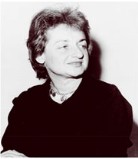 Jacqui: Do you know, I was brought up a Catholic and I changed the Lord's Prayer and I said, “Our mother, who art in heaven, Sister we call 12)Thy name. Our kitchen's done, our nursery's run on Earth and it isn't Heaven. Give us the right to earn our bread and forgive us our 13)trespasses as we forgive men who trespass against us. Lead us not into temptation, but deliver us from Adam. For 14)Thine is the freedom and the power and the glory for ever. A-women.” And a couple of Irishmen said, “That's 15)sacreligious!” But it made its point.
Jacqui: Do you know, I was brought up a Catholic and I changed the Lord's Prayer and I said, “Our mother, who art in heaven, Sister we call 12)Thy name. Our kitchen's done, our nursery's run on Earth and it isn't Heaven. Give us the right to earn our bread and forgive us our 13)trespasses as we forgive men who trespass against us. Lead us not into temptation, but deliver us from Adam. For 14)Thine is the freedom and the power and the glory for ever. A-women.” And a couple of Irishmen said, “That's 15)sacreligious!” But it made its point.
贾姬:你知道吗,我从小是个天主教徒,我改了祈祷词:“天堂的圣母啊,我们的姐妹,厨房不是我们的圣地,喂养孩子不是我们唯一的才能,地球不是天堂。请赐予我们自力更生的权利,原谅我们越域而活,正如我们原谅男人擅闯我们的领域一样。请您引导我们远离诱惑,请您把我们从亚当身边解放出来,因为您代表了永恒的自由、力量和荣誉。阿乌门(译者注:对比“A-men”的祈祷语)。”一些爱尔兰人大呼:“这真是亵渎神灵!”但它的确表达了一个观点。
Claire: Most importantly, that point seemed to 16)resonate for a whole new 17)swath of women.
克莱尔:更重要的是,这个观点引起了大部分女人的共鸣。
Jacqui: This was a joyous expression of “Ahhh, I'm free at last and nobody is gonna stop me now!” I think what we were realizing is, “We have the power!” The hell with what our mothers told us because some of our mothers told us: “That's 18)unladylike; don't do this;” etc. We're gonna do it! And maybe that was the joy that it took, how long—from 1920 to 1970?
贾姬:这是一个欢快的宣言——“哈,我终于自由了,现在没人能阻止我了!”我想我们渐渐意识到“我们有能力这样做!”妈妈告诉我们的——有些妈妈会跟我们说:“那样不淑女,别那么做。”如此那般的,都见鬼去吧。我们就是要做!或许,我们享受这种快乐花费了多久来着——从1920年到1970年的时间?
Claire: Did it feel like a turning point? Did it feel like real power?
克莱尔:你觉得它就是个转折点吗?你能确实感受到那股力量吗?
Jacqui: Yes it was because before—listen, even my family was embarrassed. My mother, later on she joined us and she worked for the 19)ERA; she even got the Catholic Daughters to vote for the Equal Rights Amendment. Before this they had laughed at us, they made fun of us, they…we heard horrible things, but once we had this march and the strike, we were a movement. And around the United States, all these women who had been watching us, they joined!
贾姬:是的,因为从前——听着,即便我的家人都觉得很丢脸。我的妈妈后来加入我们,为《平等权利修正案》工作奔波,她甚至争取到一些天主教徒为《平等权利修正案》投上一票。在此之前,他们(家人)取笑我们,拿我们开玩笑,他们……我们也听到很难听的话,但我们组织了这个游行示威,我们发起了一项运动。在美国,看过我们游行示威的妇女,无一例外都加入进来了!
